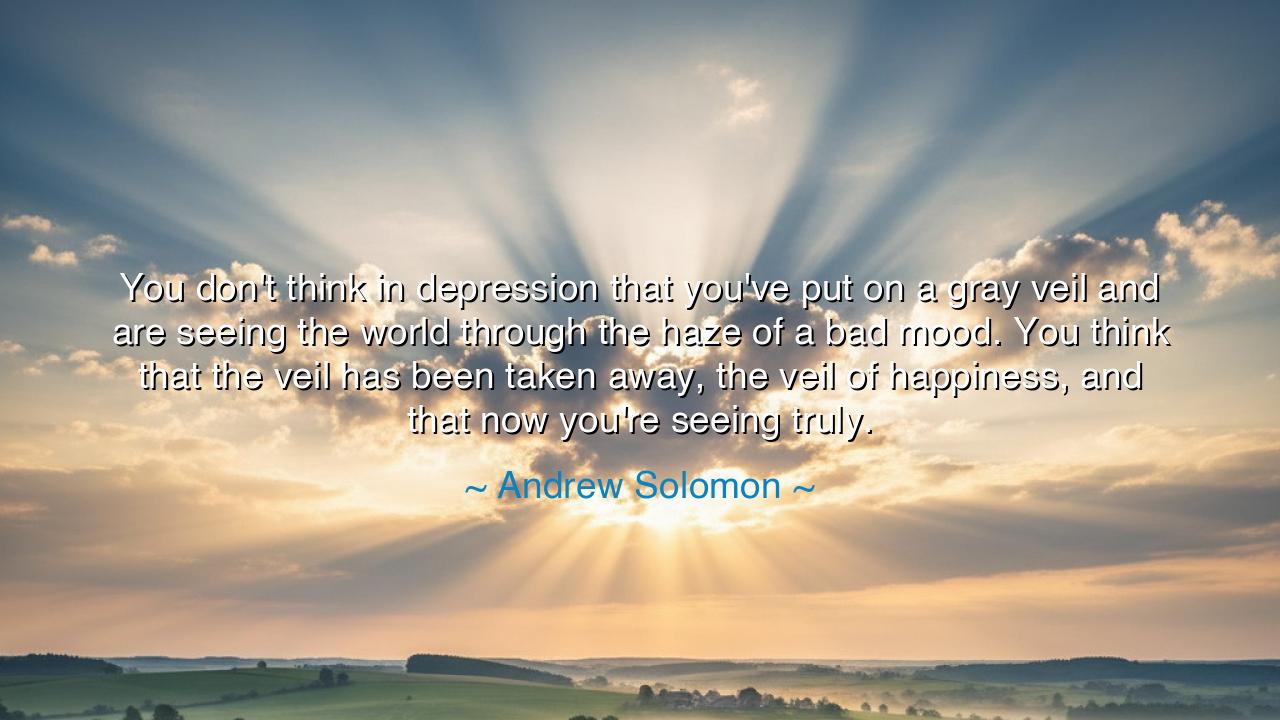
You don't think in depression that you've put on a gray veil and
You don't think in depression that you've put on a gray veil and are seeing the world through the haze of a bad mood. You think that the veil has been taken away, the veil of happiness, and that now you're seeing truly.






The words of Andrew Solomon—“You don’t think in depression that you’ve put on a gray veil and are seeing the world through the haze of a bad mood. You think that the veil has been taken away, the veil of happiness, and that now you’re seeing truly”—speak with the sorrowful clarity of one who has walked through the valley of shadows. They are not the reflections of a distant philosopher, but the testimony of one who has known the weight of despair and returned with wisdom. These words unveil the cruel deception of depression, the illusion that what one feels in darkness is truth itself, and that all joy was a lie. It is a tragedy of perception, a fog that convinces the soul that the fog is the world.
In the ancient world, such affliction was known not by the name of depression but as melancholia, the black bile of the spirit. Physicians and poets alike wrote of it as a shadow that settles on the heart, stealing light from the mind. Yet the ancients, too, understood that this darkness does not merely cloud vision—it distorts reality. In sorrow, one believes he sees the world as it truly is: cruel, empty, and meaningless. But this, Solomon teaches, is the deepest illusion of all. Happiness is not a lie; it is a light that the shadow seeks to extinguish.
The veil, as Solomon calls it, is a metaphor as old as time. In joy, we see through a glass radiant and alive; in depression, that glass shatters, and we mistake the shards for truth. The man in despair does not think he is blinded—he thinks he has awakened. He believes he now sees the hidden rot beneath the flowers, the silence beneath laughter, the futility beneath effort. But in truth, he is caught within a mirror of his own pain, mistaking reflection for revelation. The veil of happiness he thinks removed was never a lie—it was the necessary light that gave meaning to all things.
Consider the story of Abraham Lincoln, who, though remembered as a figure of strength and leadership, was haunted by profound melancholy. Friends would find him lost in stillness, staring into nothing, convinced that life held no joy. Yet it was not cynicism that defined him, but the courage to act despite despair. He learned, as Solomon teaches, that depression lies—it tells us the darkness is real and the light is illusion. But through persistence, through duty, and through compassion, Lincoln proved that light can return, even if it must be kindled from ashes.
To understand Solomon’s words is to understand the nature of perception itself. The mind, when clouded by despair, projects that despair upon the world, and the world reflects it back. In those moments, reason falters, and emotion becomes truth. Thus, the wise must learn to question the voice of despair. When the mind whispers, “This is reality,” the soul must answer, “This is pain speaking.” For the ancients believed that the mind can be both healer and betrayer, and the heart must learn which to trust.
Yet in these words there is also compassion. Solomon does not condemn the sufferer; he understands him. The one who has walked in grayness cannot be told simply to “see the light,” for to him, the light itself feels false. Healing begins not in denial, but in remembrance—that truth is larger than sorrow, and that feeling empty is not the same as being empty. The veil of happiness is not deceit; it is the world as it was meant to be seen—alive, colored, and full of grace.
And so, dear listener, let this wisdom settle into your spirit: when darkness descends, do not mistake it for enlightenment. When your heart tells you that joy was a lie, know that it is the darkness that lies. Hold faith in the light, even when you cannot see it. Seek kindness, for it rekindles warmth; seek connection, for it reminds you that you are not alone. Like the dawn that follows every night, joy may vanish from sight but never from existence. The lesson of Solomon is both ancient and eternal: the world is not gray, though our hearts may be—and to wait for light, to believe it will return, is itself an act of seeing truly.






AAdministratorAdministrator
Welcome, honored guests. Please leave a comment, we will respond soon